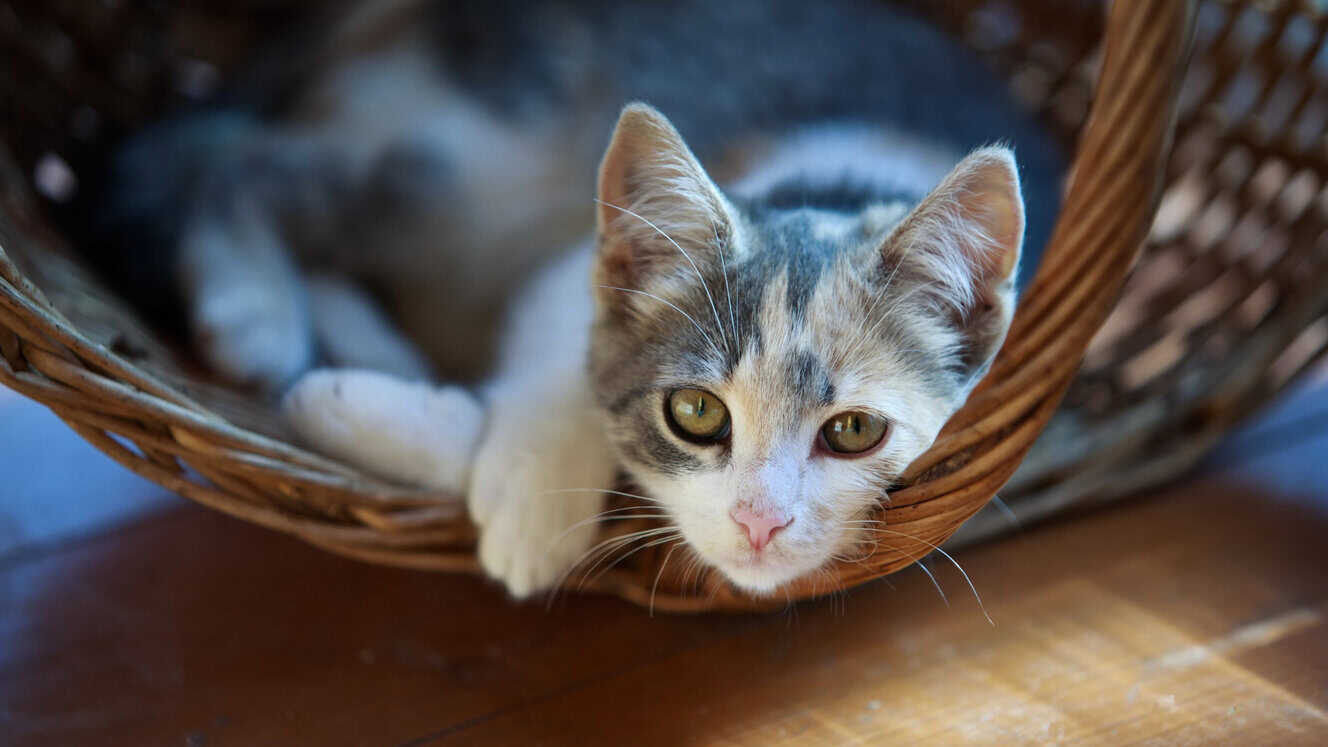
When your adorable, affectionate kitten starts to grow up and suddenly starts zooming around the place, knocking stuff over, doing disappearing acts and demanding attention at the most inconvenient times, it can be a challenging time for even the most devoted cat carer. Thankfully, according to feline experts, it’s just a phase.
“They may not be playing loud music or staying out late with their mates, but cats go through an adolescent phase just as we humans do,” says Your Cat.
And, although it’s a totally natural part of growing up, it can be a testing time for cat parents. Read on to find out more about the changes your cat goes through that affect their behaviour, signs they’ve entered their ‘teenage’ phase, and practical ways you can help them channel their challenging behaviour in positive and rewarding ways.
Understanding your young cat’s ‘teenage’ phase
“Cats do go through a ‘teenage’ phase, typically around the time they reach puberty,” advises Cats Protection. “During this time, their behaviour can shift as they navigate the transition from kittenhood to adulthood. The most difficult age for a cat can vary depending on the individual. But generally, adolescence (around four months to two years) is often considered the most challenging phase. During this period, cats undergo significant physical and behavioural changes. This can result in certain difficulties for both the cat and their owner.”
“They’re nearly fully grown, they’re getting a lot bigger and stronger, a lot more able and agile, and getting a bit more athletic, but mentally, they’re still very much learning about themselves, about the world, and about what it’s like to live with people,” says RSPCA cat welfare expert Alice Potter. “These cats are starting to look like an adult cat, but mentally they’re still very much learning. So, we may think that they should be behaving themselves a bit more sensibly now because they’re not a cute little kitten, but really not always appreciating that they still are very immature in their mind.”
Just like teenage humans, young cats push boundaries
Jessica Char, a member of the International Association of Animal Behavior Consultants, explains: “During adolescence, a cat’s brain is developing. However, the different parts of the brain mature at different rates. Like a teenage human, a teenage cat has more development and activity in the limbic system compared to the prefrontal cortex. Basically, the limbic system is all about instant gratification and reward seeking, while the prefrontal cortex handles impulse control. This leads to a young cat that is eager to explore the world and seek out fun but that doesn’t yet have many brakes on their behaviour. It’s completely normal for a ‘teenage’ cat to have worse behaviour than when they were a kitten. They are pushing boundaries and testing new ways of interacting with the world.”
“Adolescent cats tend to become incredibly curious,” adds Rachael Gerkensmeyer on Catster. “They want to learn more about the world around them, which can get them into trouble. They might try climbing up a bookshelf or digging the dirt out of the pot of a houseplant. They may decide that a slipper would make a great chew toy. They might even scratch up the furniture and carpet. Adolescent cats also tend to have more confidence and become demanding. They might try to test boundaries by ignoring you and behaving in ways that they know you don’t approve of. They could even decide that it’s a good idea to wake you up in the middle of the night for fun or attention.”
Gaining wisdom helps young cats become successful adults
For a young cat, the world is an endlessly stimulating and intriguing place, so it’s only to be expected that they become obsessed with all the new experiences on offer to them.
Rachael Gerkensmeyer notes: “The whole point of adolescence is to gain wisdom and independence that will aid in being successful as an adult. Therefore, you should not be surprised if your teenage cat doesn’t seem to want to cuddle or play with you quite as much as they did when they were kittens.”
Understand your cat better with our cat communication guide >>
Signs your cat is in their ‘teenage’ phase
Cats Protection’s registered veterinary surgeon Sarah Elliott outlines how your cat’s behaviour can shift as they navigate the transition from kittenhood to adulthood:
- INCREASED INDEPENDENCE Cats may become less dependent on their owners and more interested in exploring their environment. They might spend more time alone or seek solitude, which can resemble a rebellious teenage attitude.
- HEIGHTENED ENERGY As they grow, cats might experience bursts of high energy, leading to more playfulness or zoomies. They can also become more curious, investigating new spaces or objects.
- AGGRESSION Some cats might show signs of territorial behaviour or increased aggression during this stage. This can be a result of reaching sexual maturity, especially if they are unneutered.
- MOOD SWINGS Like teenagers, cats may exhibit mood swings. They might be affectionate one moment and distant the next. Or they may demand attention when it’s inconvenient.
- SOCIALISATION CHANGES Cats may also start to interact with other animals differently. They may become more territorial or might challenge other pets in the house, especially if they are starting to feel more mature and confident.
She adds: “After this teenage phase, cats tend to settle into more balanced and adult behaviour, especially if they are neutered.”
Ways to help your cat cope with their ‘teenage’ phase
According to Australian cat behaviourists Catology, you can avoid a lot of unwanted behaviours by creating an environment that your teen cat can interact with and get rewarded appropriately. “Rewarding good behaviour is very important at this stage,” they advise. “It’s very easy to get angry at the ‘bad’ behaviour, but this often only serves to get our attention, which can be rewarding for a cat. Ideally, ignore the bad behaviour (no attention) and reward the good. This means treats for sitting in the kitchen without jumping on the bench, nice affection for sitting on your lap or next to you on the couch. Actively look for opportunities to reward behaviours you want, and that’s what you’ll continue to get.”
Here are some ideas these feline behaviour experts suggest are well worth trying to channel your young cat’s behaviours in a positive, rewarding way:
- CAT TREES/TOWERS/SHELVES Most cats love to be up off the ground – this provides them with perceived safety, confidence and a view over their territory. Placing these in socially significant areas (where you and your family spend most of their time) is key. Having a cat tree in the spare room that nobody uses may not be socially interactive enough for a young cat.
- SCRATCHING POSTS These are very important if you don’t want your furniture to be destroyed. Look for posts that are at least 80cm high so your cat can fully stretch out. Many cat towers double as scratching posts. Also put these in socially significant areas.
- LOTS OF PLAY IS REQUIRED Make sure it’s with toys and not your hands, otherwise you’ll inadvertently train a cat who thinks your hands are playthings.
- OUTDOOR ENCLOSURES OR CATIOS These are amazing additions and can keep your teen (and older cats) mentally and physically happy for hours.
- ENOUGH LITTERBOXES The general rule of thumb for the number of litterbox locations is the number of cats, plus one. This ensures choice, and also can prevent ‘resource guarding’ in multi-cat households.
- FOOD AND WATER STATIONS The same rule applies for these.
- TOYS THAT YOUR CAT CAN PLAY WITH WITHOUT YOU The right toys can keep a cat from depending solely on you for play. The ‘right’ toys are very individual to the cat. Some cats will shun most toys on the market, but absolutely love ping pong balls. Others go bananas over flapping fish. This is really a trial-and-error approach.
- TREASURE HUNTS AND FOOD PUZZLES Hiding treats around the house before you go to work, or when you need to get some work done at home will give them some rewarding activity.
“Adolescence is just a phase,” reassures Jessica Char. “In the end, your cat will come out at the other end as an adult. Most cats outgrow much of their impulsive behaviour and ‘chill out,’ at least a bit. Your goal will be to continue to reinforce the behaviour you want, minimise opportunities for your cat to develop bad habits, and then to stay the course until their brain catches up with their body.”
EVERY CAT DESERVES A DELICIOUS, NUTRITIOUS DINNER!
At Burgess Pet Care, all our cat food is made using premium ingredients to ensure excellent quality and superior taste to help keep your cat happy and healthy – from kitten, to adult and mature and Burgess Neutered Cat with Chicken – an advanced, high protein, complete food with added L-Carnitine to help maintain a healthy weight.
- Salmon? Duck? Chicken? Let your adult cat pick their favourite flavour with our fussy cat bundle >>
- Our cat diet and nutrition guide is here to help you create a meal plan that's tailored especially for your feline friend.
- How often should you feed your cat? Find out why little and often suits most cats – and the reason why play should be part of your feeding routine.
- Adapting your cat’s diet throughout their life What you choose to feed your cat can make all the difference.
CARE MORE Find out more about caring for your cat from Burgess, the Pet Care Experts.
Is your cat a Burgess cat? Join our Pet Club for exclusive offers and competitions – and expert advice from our in-house vet, Dr Suzanne Moyes.
>>>>>>>>>>>>>>>>>>>>>>>>>>>>>>>>>>>>>>>>>>>>>>>>>>>>>>>>>>>>>>>>>>>>>>>>>
If you found this interesting, you may also like:
CARING FOR KITTENS Discover how you can help your kitten get the very best start in life.
KITTEN TIMELINE – WHAT ARE YOUR KITTEN’S MILESTONES? When will my kitten eat solid food? When will my kitten start to purr? When will my kitten be able to go outside? Mark your meowing munchkin’s milestone moments with our comprehensive kitten timeline.
THE NEXT BIG STEP FOR YOUR LITTLE CAT When does your kitten become a cat? What changes will you see in their behaviour? When do you need to switch them over from kitten to adult cat food – and what are the nutrition differences that benefit them as they grow?
A LITTLE EXTRA HELP FOR OLDER CATS When our beloved cats get older, it’s our job to make their life as comfortable as possible. Their fast-paced days of crazy kitten antics may be a distant memory, but they still possess the desire to exhibit their natural feline behaviours – they just need a little help from us.
PLAY WITH THIS – NOT THAT! HOW TO CHOOSE THE BEST CAT TOYS Cats love stalking things, chasing things, and exploring things with their paws and teeth, which can sometimes lead to a whole mess of trouble. Introducing a selection of feline-friendly toys will keep your pet entertained while ensuring they won’t come to any harm.
MY CAT IGNORES ME – WHY? Unlike dogs, who generally want to be involved in every situation, cats are known for being independent. While some cats can be quite social, it can be hard to take when your favourite feline seems to take absolutely no notice of you. So why is this the case?
PLAY BEHAVIOUR OF CATS SURPRISES SCIENTISTS While there are lots of things that cats do which cause scientists plenty of head-scratching moments, new research into the way that cats play has resulted in some rather baffled boffins...
HOW TO HANDLE YOUR CAT Cats like to feel in control of whatever situation they’re in and are quick to show when they’re not happy. Never is this more evident when it comes to being handled when they don’t want to be.
IS YOUR CAT REALLY MAD AT YOU? Whether it’s because you’ve had to take them to the vet, or you accidentally stepped on their tail, your cat may give you the impression that they’re really cross with you. But can cats really hold grudges?
DOES YOUR CAT KNOW THEIR NAME? Whatever name we choose to bestow upon our beloved pet cats, does it make any difference to them? Do they actually understand that they’re called Alfie or Bella or even Archibald von Snugglemuffin?
CAN YOU TRAIN A CAT? Felines excel at training their human guardians to give them food, attention and a cosy lap to curl up on. But is it possible for us to train them?
HOW TO TELL IF YOUR CAT REALLY LOVES YOU While you may adore your captivating cat, how does your enigmatic feline companion feel about you?
SHOULD LILIES CARRY A HEALTH WARNING? Did you know that lilies are so poisonous that a cat can suffer fatal kidney failure just from nibbling a leaf, licking pollen off their coat or even from drinking water from a vase with cut lilies in it?
ARE YOU AND YOUR CAT MORE ALIKE THAN YOU THINK? If you have a grumpy Tabby cat, a super friendly Ragdoll cat, or fiendishly feisty Bengal cat, could this actually say more about you than your pet?
10 THINGS I HATE ABOUT YOU Super tidy house? Cleaning blitzes? Cuddle overload? If our feline friends could tell us what they really think, here’s what they’d probably say about some of the things we do that they’re none too happy about…
CAT BREEDS – TAKE A CLOSER LOOK AT SOME OF THE UK’S MOST POPULAR TYPES OF CAT Siamese or Bengal? Norwegian Forest or Maine Coon? Ragdoll or Russian Blue? Which breed of cat do you find most captivating? We count down 10 cat breeds that are riding high in the popularity charts, plus one favourite feline that’s not actually a breed at all…
MUSIC TO THEIR FURRY LITTLE EARS? What’s on your playlist? Cat Stevens? The Stray Cats? The Pussycat Dolls? And have you ever wondered if your cat appreciates your taste in music, or would they prefer music created especially for them? Yes, it’s a thing!
THE EYES HAVE IT When it comes to the mysterious task of understanding cat language, focusing on one of a feline’s most appealing features – their captivatingly beautiful eyes – could be the key.
DOES YOUR CAT RECOGNISE YOUR HAPPY FACE? How do cats see humans? Do cats recognise faces? Do cats remember people? Do cats miss their owners? Do we own cats or do cats own us?
GIRLS V BOYS – FELINE MYTHS AND MISCONCEPTIONS Do male and female cats act differently because of their gender? Are generalisations about laid back, lap-loving boys and aloof, independent girls simply myths – or is there any truth to them?THE HOMING INSTINCT – CAN CATS REALLY FIND THEIR WAY HOME? Top tip – it’s much easier if they’re microchipped! Plus, what a change in the law means for every cat owner…
EXPERT APPROVED: Dr Suzanne Moyes MVB, MRCVS

















